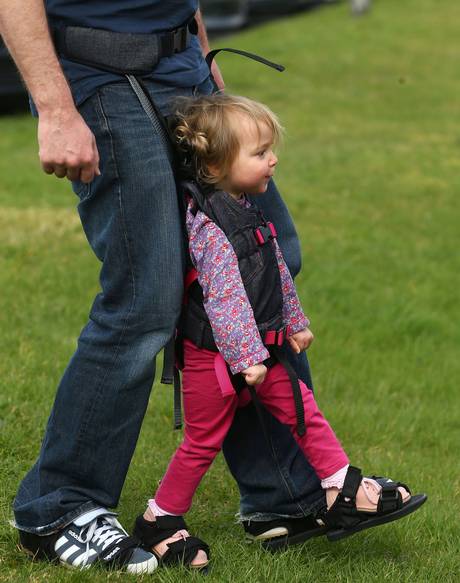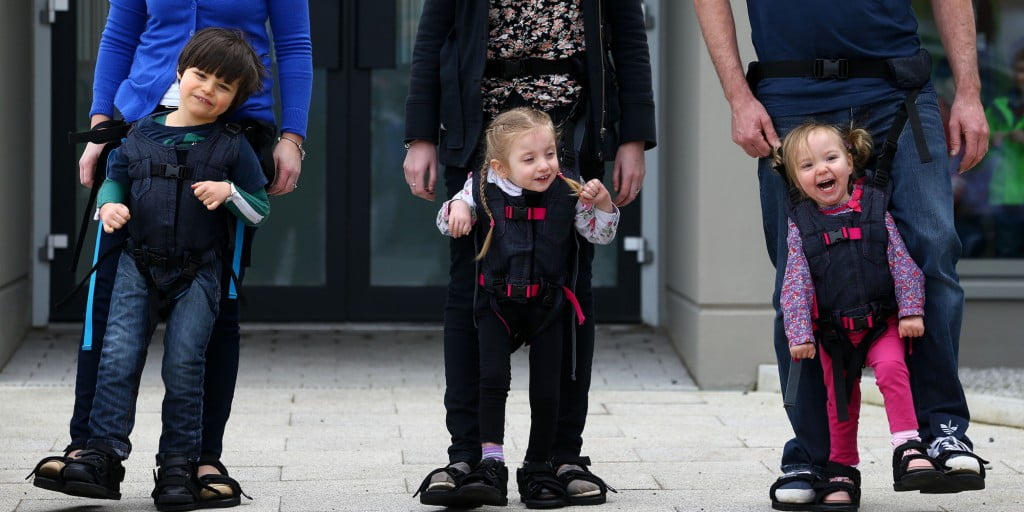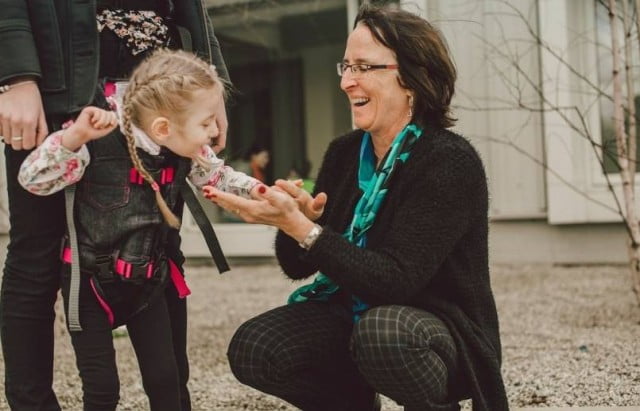Mother’s Day is a good time to reflect on the amazing lengths some moms go to to ensure the well being of their children. One such “supermom” is Debby Elnatan, a former Israeli stay-at-home mom who became a press sensation when she invented the “Upsee”, a harness that allowed her young disabled son, and other handicapped children around the world, to walk in tandem with their parents.
When we first wrote about the Upsee harness a little over a year ago, the device was just gaining worldwide attention. A year later, NoCamels speaks to the inventor of the Upsee to hear about how her life-changing device is reaching more children and parents around the world.
A low-tech device with high impact
Debby came up with the idea for the harness, which allows handicapped children and parents to walk in unison, when she found out that her son Rotem had cerebral palsy and would be confined to a wheelchair for the rest of his life. Armed only with a mother’s love and a relentless drive to make her son’s life as normal as possible, Debby spent years creating the Upsee.
The special harness is fastened on to the guiding adult at the waist, enabling them to pull the child up to a standing position using another harness attached to the child’s shoulders and legs. Then, the child and adult fasten the shoe bindings which help the two take steps in unison.
 What Debby didn’t expect was that her invention would become such an overnight success. “On the day we started selling the Upsee,” she tells NoCamels, “parents all over the world were waiting on the phone to order it. There were about 1,300 orders placed within the first 24 hours and 2,000 orders placed within the first 48 hours.” Since the international launch, which was conducted by British medical equipment manufacturer Leckey, over 6,000 Upsee harnesses have been sold in over 120 countries around the world.
What Debby didn’t expect was that her invention would become such an overnight success. “On the day we started selling the Upsee,” she tells NoCamels, “parents all over the world were waiting on the phone to order it. There were about 1,300 orders placed within the first 24 hours and 2,000 orders placed within the first 48 hours.” Since the international launch, which was conducted by British medical equipment manufacturer Leckey, over 6,000 Upsee harnesses have been sold in over 120 countries around the world.
SEE ALSO: Mom Of Disabled Son Creates Harness That Allows Him And Other Children To Walk For The First Time
Just the ability to stand tall, says Debby, has not only helped children emotionally; there are already reports of positive physical effects stemming from use of the harness. “We’ve gotten amazing reports of the therapeutic value. There was one child who had his hip operation cancelled because through the opportunity to stand and walk, his hip joint was normalized. Other children have seen improvement in their walking abilities and head control, because finally they have something to see and a way to hold their weight.”
The best part of their kids’ day
“Parents upload pictures of their kids using the harness in ways that I never imagined,” says Debby of the wave of positive responses she has received, “They send in pictures of their kids in the harness while they are fishing, washing cars and even skateboarding. We are always interacting with our customers through the amazing photos and videos they share of their child wearing the harness.”
SEE ALSO: First Touch-Free ‘Sesame’ Smartphone Allows Disabled To Control Phones With A Nod
Sign up for our free weekly newsletter
SubscribeAccess to the harness is now easier than before, with an elaborate website that allows parents and caregivers around the world to purchase the harness, accessories that go along with it, and to interact with other parents to get pointers on how to best use the harness. Being able to reach out to a larger audience, Debby has worked hard to develop an expansive line of products built around the Upsee.
But the most popular section of the website may be the heartwarming stories of children with disabilities enjoying every minute of life with their Firefly devices. Debby tells me of one Israeli mother who sent her a picture of her child in the Upsee harness that included the message, “My boy cries bitterly when I have to take him out of the Upsee.”
‘The most famous mother in the world’
Despite the viral success (there were 500,000 shares on the first pictures of the Upsee on The Daily Mail’s Facebook), Debby admits that there are still some challenges in getting her products to the children who need them most. “The company is setting up distributors where online sales aren’t working. And now Leckey’s contacting therapists and caregivers to give them more information on the line of products.”
Currently, the Upsee has been approved by the Food & Drug Administration in the United States, as well as medical device authorities in Israel and Sweden. However, in her home country of Israel, Debby admits she felt for a long time, “like a shoemaker going barefoot,” until the Upsee was picked up by Chemitech in Israel, where it is now available for sale.
In addition to wide-spread international press and support from organizations like AIPAC and the European Union, Debby tells me that she has been selected as a winner of the International Patient Innovation Awards, an annual honor bestowed by a panel of Nobel Prize winners (including Technion professor Aaron Ciechanover) for innovations created by patients and their caregivers.
Debby believes that the success of the past year, which led one radio station in Italy to declare her “the most famous mother in the world,” is only the beginning. “I have been working like crazy to ride this wave of success and to launch the rest of my line of equipment. So much of today’s equipment supports children vertically, but much of it is disabling in some form. The approach is to be behind your child, but to make them feel like they are the mover – it’s an approach, not just a product.”
Photos: Firefly
Related posts

Rehabilitation Nation: Israeli Innovation On Road To Healing

Israeli High-Tech Sector 'Still Good' Despite Year Of War







Facebook comments